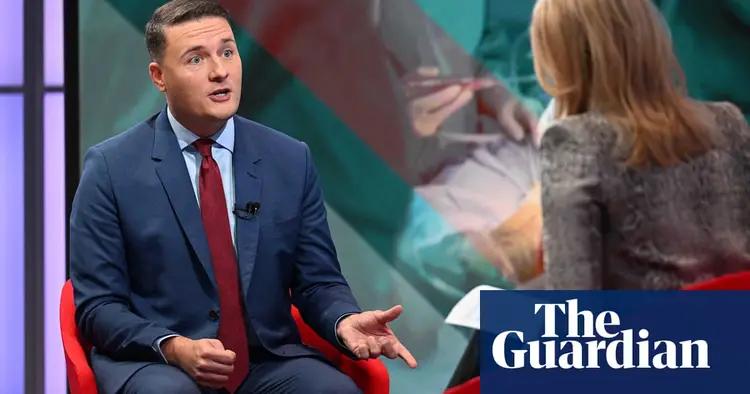Wes Streeting denies ‘dystopian future’ over weight-loss jabs for unemployed

Wes Streeting has rejected the notion that his proposal to provide new weight-loss injections to unemployed individuals to assist them in finding jobs would lead to a "dystopian future" where people struggling with their weight would be "forced to receive injections."
The UK's health secretary admitted that weight-loss medications alone aren't the solution to the country's obesity problem. He mentioned earlier this week that these drugs could have a significant effect on increasing workforce participation.
He mentioned during an interview on BBC One's Sunday with Laura Kuenssberg that new medications like semaglutide and tirzepatide have the potential to significantly change the way we address obesity trends.
In an article for the Telegraph, Streeting pointed out that increasing waistlines are putting pressure on the NHS. He suggested that medications could be given to individuals to help them return to work and reduce expenses for the healthcare system.
The government has revealed a £279 million investment from Lilly, the biggest pharmaceutical company in the world. This agreement is anticipated to involve practical studies examining how weight loss injections affect unemployment rates.
"I believe that the solution to obesity isn't just about using weight-loss injections. However, there is substantial evidence showing that these injections, when paired with adjustments in diet and exercise, can assist individuals in losing weight. This can significantly lower the risks of heart disease and diabetes, which is revolutionary," Streeting stated.
They're not the only answer, and I don’t want to encourage a culture of reliance. I'm not looking to imagine a bleak future where I'm going around... forced to inject overweight unemployed individuals – that's definitely not what I'm aiming for.
"If we can reverse the current trends in obesity, it would benefit both the health of the country and its economy. We need to move from simply managing illness to focusing on prevention. However, this doesn’t replace the importance of maintaining a healthy diet, proper nutrition, and regular exercise."
During a series of media interviews, Streeting mentioned that he had come to an agreement regarding NHS funding with the chancellor, Rachel Reeves. However, he acknowledged that it wouldn't be possible to resolve the issues that have accumulated over the past 14 years in just one budget.
He emphasized the importance of both reform and investment in the NHS, acknowledging that spending on healthcare means there’s less money available for other sectors. He also implied that hospitals would need to boost their efficiency in order to receive extra financial support.
"The strategy that the chancellor and I are pursuing is to tie funding to changes in the system," he shared with the BBC. When questioned about whether hospital trusts would face consequences for noncompliance, he responded, "It's important for us to keep performance in check."
“I believe it's a mutual exchange. As Secretary of State, it's my duty to provide system leaders with the necessary resources to carry out their tasks, but it is ultimately their responsibility to ensure that those tasks are completed.”
Streeting mentioned that he was increasing the number of NHS appointments, but he lacked the specific data to determine if the government was on track to fulfill its promises. He emphasized that resolving the issues within the NHS necessitates tackling the ongoing crisis in social care as well.























































